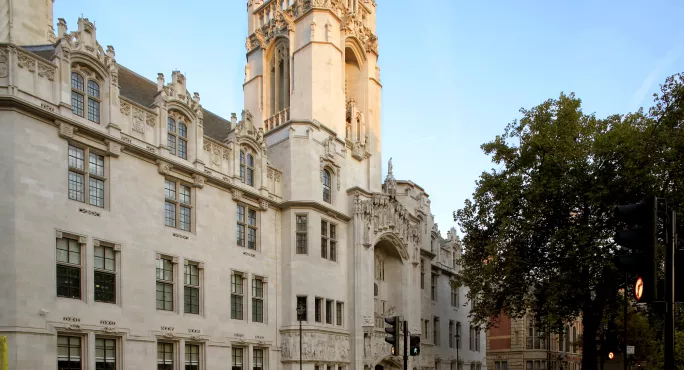- Home
- Campaigners win Supreme Court challenge against ‘Named Person’ child safeguarding scheme
Campaigners win Supreme Court challenge against ‘Named Person’ child safeguarding scheme

A legal challenge against Scotland’s controversial Named Person scheme was upheld this morning at the Supreme Court in London.
Judges agreed that legislation driving the scheme was “outside the legislative competence” of the Scottish Parliament and could “give rise to disproportionate interferences” in family life.
Named Person would provide a single point of contact - often a teacher or headteacher - to oversee the wellbeing of every under-18 in Scotland.
Backers of the scheme say it would help to avoid repeats of tragedies in which children have died after poor communication between child-protection bodies.
Opponents, however, believe that what they call “state guardians” would prove ineffectual and would invade families’ privacy.
Scotland’s deputy first minister and education secretary, John Swinney, insisted after today’s verdict that the “attempt to scrap the Named Person service has failed” and that the principle of a single point of contact for a child was not in question.
He acknowledged, however, that changes are now required - within 42 days - over how information about children would be shared if the scheme is to comply with the European Convention on Human Rights.
Alison Preuss, a campaigner against Named Person who coordinates the Scottish Home Education Forum, said: “I am quite puzzled by the government’s statement. Because a single point of contact was never in dispute - it was the [sharing of] information that was contentious. The appellants are very pleased about the result.”
Speaking outside the Supreme Court minutes after the decision, Ms Preuss added: “If the named person had been a voluntary single point of contact, it would never have come to the Supreme Court. The judgement was quite specific - parents must not feel coerced. There cannot be repercussions if they tell [a named person] to go away.”
The case made by the appellants - including the Christian Institute, the Family Education Trust, ME charity the Tymes Trust, CARE (Christian Action Research and Education) and three individuals - came after an appeal last year to the Court of Session in Edinburgh was rejected and arguments against Named Person were dismissed as “hyperbole”.
But the Supreme Court found today that “confidential information concerning a child or young person’s state of health (eg, as to contraception, pregnancy or sexually transmitted disease), could be disclosed to a wide range of authorities without either the child or young person or their parents being aware of the interference with their…rights”.
This could happen, it found, “in circumstances in which there was no objectively compelling reason for the failure to inform them”.
It also found there was a “risk that parents will be given the impression that they must accept advice in relation to the services offered by a named person…and that their failure to cooperate would be taken as evidence of risk of harm. Care should therefore be taken to emphasise the voluntary nature of the advice, information, support and help offered by the named person”.
Scheme ‘will be implemented as soon as possible’
In a statement, Mr Swinney said the Supreme Court had ruled that the principle of providing a named person for every child in Scotland did not breach human rights and was compatible with EU law.
He added: “The Supreme Court has stated that the aim of the legislation, in promoting and safeguarding the wellbeing of children and young people, is ‘unquestionably legitimate and benign’. It makes clear that the principle of providing a named person to support children and families does not breach human rights.”
Ministers remained “absolutely committed” to the policy, he said, although the ruling “requires us to provide greater clarity about the basis on which health visitors, teachers and other professionals supporting families will share and receive information in their named person role”.
He added: “We will start work on this immediately so we can make the necessary legislative amendments. The service will be implemented nationally at the earliest possible date.”
Scottish Conservative leader Ruth Davidson hailed “a victory for campaigners who have exposed [Named Person] from the outset as illiberal, invasive and deeply flawed”.
She added: “If the Scottish government arrogantly tries to implement this anyway - as it has threatened to do - it will face a heavy reckoning from Scottish parents, who rightly want to be able to raise their children without state interference.”
In May, members of the Scottish Secondary Teachers’ Association (SSTA) voted in favour of demanding a delay to Named Person (article free for subscribers), despite the union having previously backed the policy.
Teachers at the SSTA annual conference feared “far-reaching implications” for workload and that the threshold for sharing families’ private information with professionals had been reduced. But another secondary teacher, writing in TESS, said Named Person would “improve the lives of our most vulnerable children”.
No MSPs voted against the legislation that paved the way for Named Person - which was due to come into force nationally at the end of August - when it was approved in in February 2014. The Conservative group abstained.
Since then, however, it has been used repeatedly by opposition parties as a stick to beat the SNP government with. In Parliament, Ms Davidson recently decried the scheme as “unworkable” and said it was dissuading teachers from applying for primary headteacher jobs.
Green co-convener Patrick Harvie hit back, however, at “disgraceful” opposition to child-protection policies such as Named Person.
Want to keep up with the latest education news and opinion? Follow TES on Twitter and like TES on Facebook
Keep reading for just £1 per month
You've reached your limit of free articles this month. Subscribe for £1 per month for three months and get:
- Unlimited access to all Tes magazine content
- Exclusive subscriber-only stories
- Award-winning email newsletters



